Unit 5 Our school life Topic 1 I usually come to school by subway 知识点讲义+练习(有答案)
文档属性
| 名称 | Unit 5 Our school life Topic 1 I usually come to school by subway 知识点讲义+练习(有答案) |
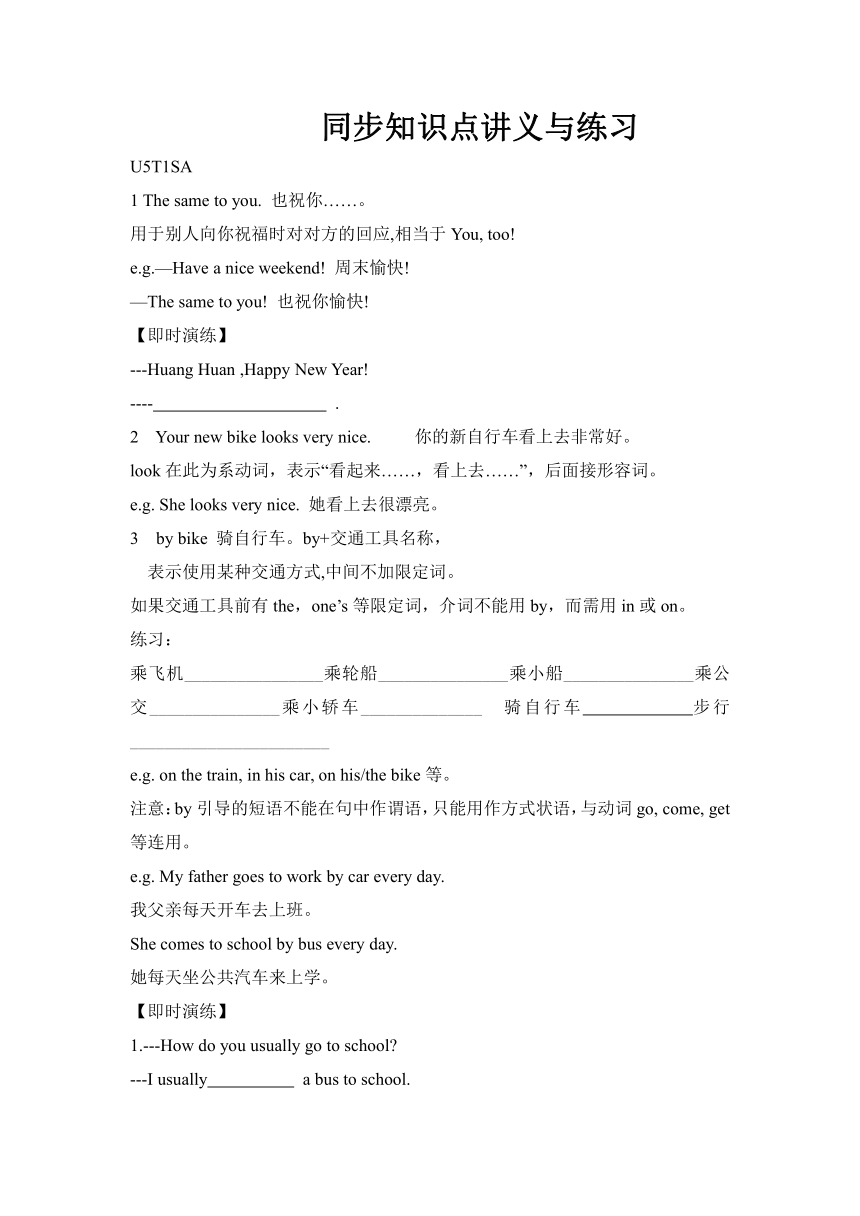
|
|
| 格式 | doc | ||
| 文件大小 | 93.5KB | ||
| 资源类型 | 教案 | ||
| 版本资源 | 仁爱科普版 | ||
| 科目 | 英语 | ||
| 更新时间 | 2020-08-27 00:00:00 | ||
图片预览

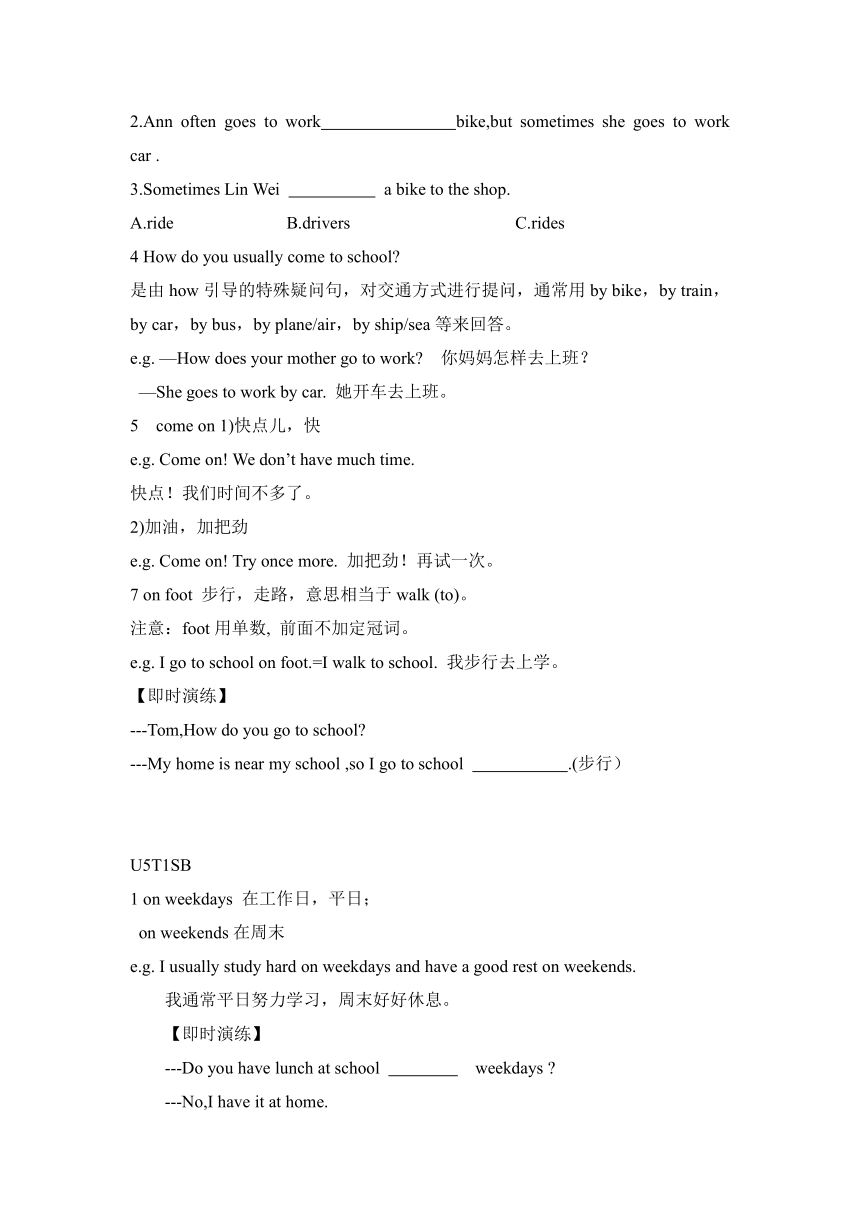
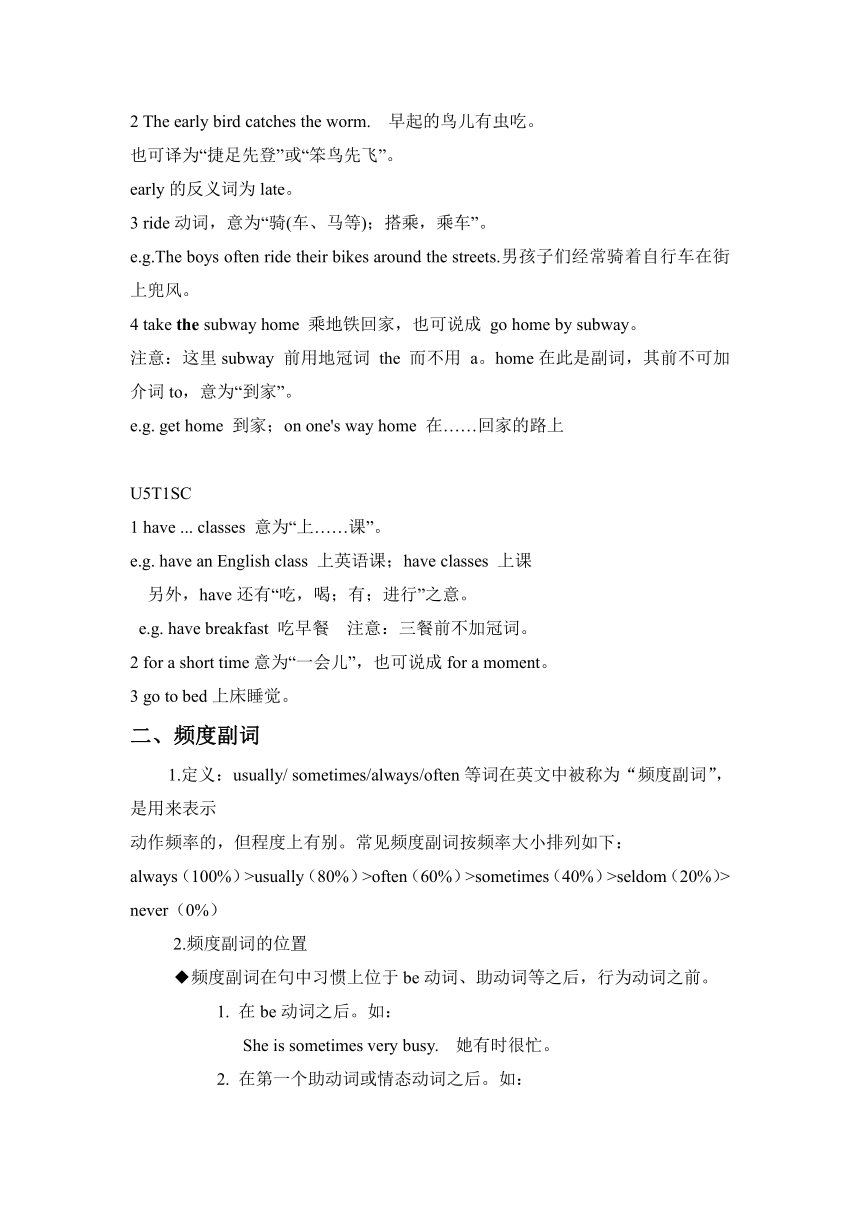
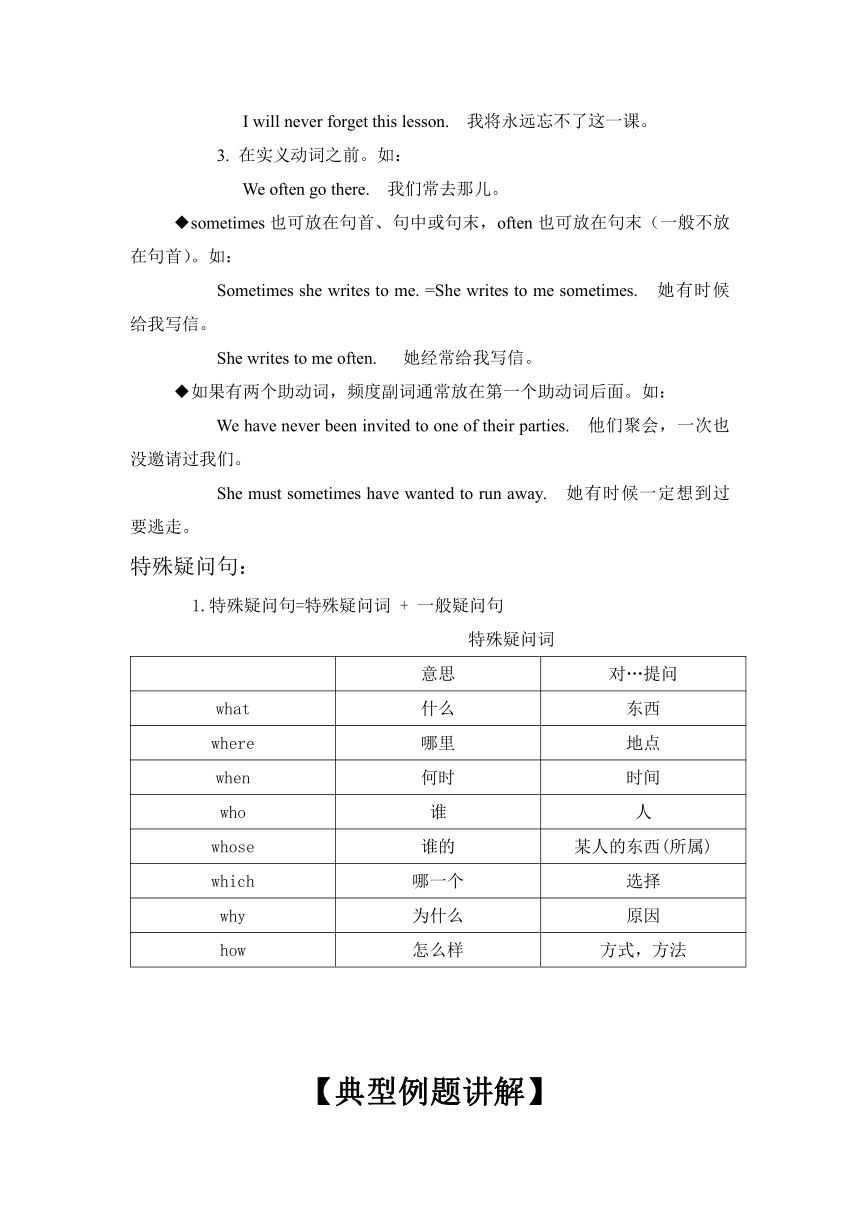
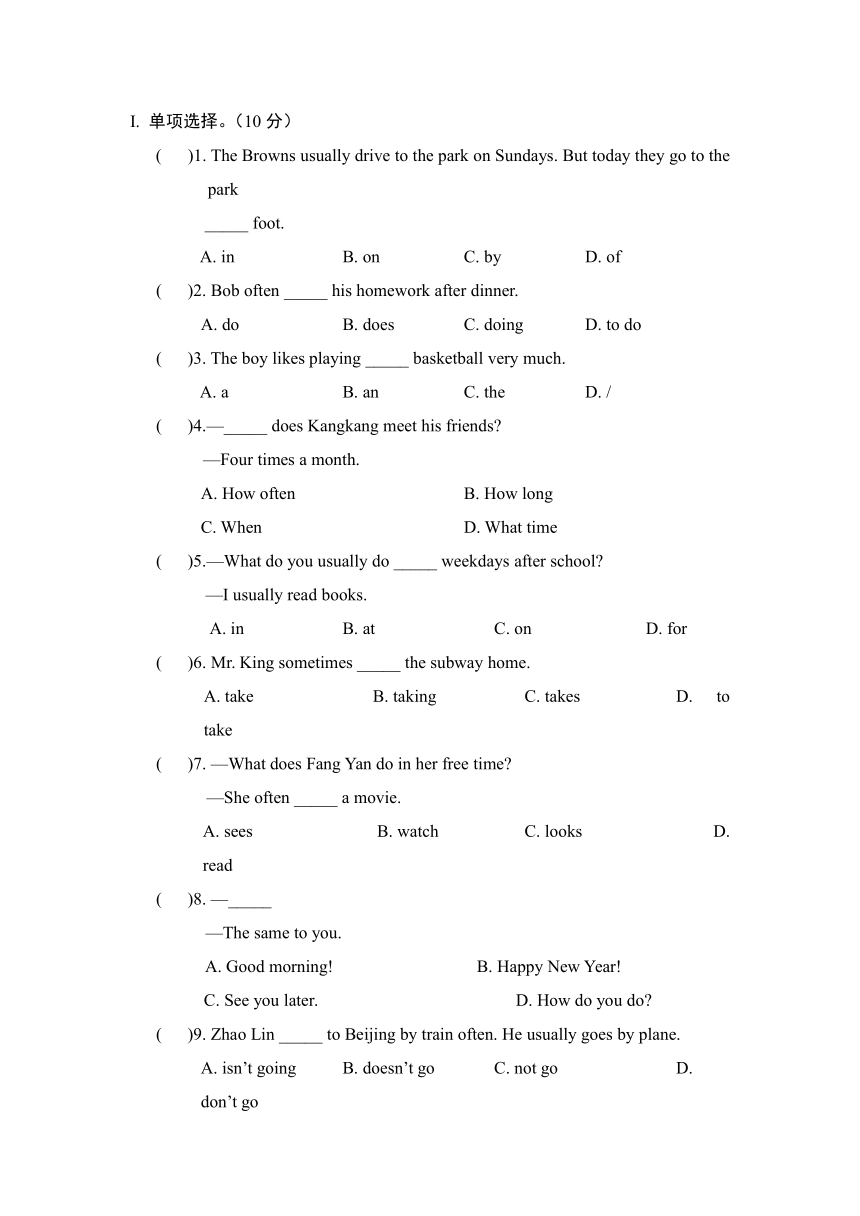
文档简介
同步知识点讲义与练习
U5T1SA
1 The same to you. 也祝你……。
用于别人向你祝福时对对方的回应,相当于You, too!
e.g.—Have a nice weekend! 周末愉快!
—The same to you! 也祝你愉快!
【即时演练】
---Huang Huan ,Happy New Year!
---- .
2 Your new bike looks very nice. 你的新自行车看上去非常好。
look在此为系动词,表示“看起来……,看上去……”,后面接形容词。
e.g. She looks very nice. 她看上去很漂亮。
3 by bike 骑自行车。by+交通工具名称,
表示使用某种交通方式,中间不加限定词。
如果交通工具前有the,one’s等限定词,介词不能用by,而需用in或on。
练习:
乘飞机________________乘轮船_______________乘小船_______________乘公交_______________乘小轿车______________ 骑自行车 步行_______________________
e.g. on the train, in his car, on his/the bike等。
注意:by引导的短语不能在句中作谓语,只能用作方式状语,与动词go, come, get等连用。
e.g. My father goes to work by car every day.
我父亲每天开车去上班。
She comes to school by bus every day.
她每天坐公共汽车来上学。
【即时演练】
---How do you usually go to school?
---I usually a bus to school.
Ann often goes to work bike,but sometimes she goes to work car .
Sometimes Lin Wei a bike to the shop.
ride B.drivers C.rides
4 How do you usually come to school?
是由how引导的特殊疑问句,对交通方式进行提问,通常用by bike,by train,by car,by bus,by plane/air,by ship/sea等来回答。
e.g. —How does your mother go to work? 你妈妈怎样去上班?
—She goes to work by car. 她开车去上班。
5 come on 1)快点儿,快
e.g. Come on! We don’t have much time.
快点!我们时间不多了。
2)加油,加把劲
e.g. Come on! Try once more. 加把劲!再试一次。
7 on foot 步行,走路,意思相当于walk (to)。
注意:foot用单数, 前面不加定冠词。
e.g. I go to school on foot.=I walk to school. 我步行去上学。
【即时演练】
---Tom,How do you go to school?
---My home is near my school ,so I go to school .(步行)
U5T1SB
1 on weekdays 在工作日,平日;
on weekends在周末
e.g. I usually study hard on weekdays and have a good rest on weekends.
我通常平日努力学习,周末好好休息。
【即时演练】
---Do you have lunch at school weekdays ?
---No,I have it at home.
2 The early bird catches the worm. 早起的鸟儿有虫吃。
也可译为“捷足先登”或“笨鸟先飞”。
early的反义词为late。
3 ride动词,意为“骑(车、马等);搭乘,乘车”。
e.g.The boys often ride their bikes around the streets.男孩子们经常骑着自行车在街上兜风。
4 take the subway home 乘地铁回家,也可说成 go home by subway。
注意:这里subway 前用地冠词 the 而不用 a。home在此是副词,其前不可加介词to,意为“到家”。
e.g. get home 到家;on one's way home 在……回家的路上
U5T1SC
1 have ... classes 意为“上……课”。
e.g. have an English class 上英语课;have classes 上课
另外,have还有“吃,喝;有;进行”之意。
e.g. have breakfast 吃早餐 注意:三餐前不加冠词。
2 for a short time意为“一会儿”,也可说成for a moment。
3 go to bed上床睡觉。
频度副词
1.定义:usually/ sometimes/always/often等词在英文中被称为“频度副词”,是用来表示
动作频率的,但程度上有别。常见频度副词按频率大小排列如下:
always(100%)>usually(80%)>often(60%)>sometimes(40%)>seldom(20%)> never(0%)
2.频度副词的位置
◆频度副词在句中习惯上位于be动词、助动词等之后,行为动词之前。
1. 在be动词之后。如:
She is sometimes very busy. 她有时很忙。
2. 在第一个助动词或情态动词之后。如:
I will never forget this lesson. 我将永远忘不了这一课。
3. 在实义动词之前。如:
We often go there. 我们常去那儿。
◆sometimes也可放在句首、句中或句末,often也可放在句末(一般不放在句首)。如:
Sometimes she writes to me. =She writes to me sometimes. 她有时候给我写信。
She writes to me often. 她经常给我写信。
◆如果有两个助动词,频度副词通常放在第一个助动词后面。如:
We have never been invited to one of their parties. 他们聚会,一次也没邀请过我们。
She must sometimes have wanted to run away. 她有时候一定想到过要逃走。
特殊疑问句:
1.特殊疑问句=特殊疑问词 + 一般疑问句
特殊疑问词
意思 对…提问
what 什么 东西
where 哪里 地点
when 何时 时间
who 谁 人
whose 谁的 某人的东西(所属)
which 哪一个 选择
why 为什么 原因
how 怎么样 方式,方法
【典型例题讲解】
Ⅰ. 单项选择。(10分)
( )1. The Browns usually drive to the park on Sundays. But today they go to the park
_____ foot.
A. in B. on C. by D. of
( )2. Bob often _____ his homework after dinner.
A. do B. does C. doing D. to do
( )3. The boy likes playing _____ basketball very much.
A. a B. an C. the D. /
( )4.—_____ does Kangkang meet his friends?
—Four times a month.
A. How often B. How long
C. When D. What time
( )5.—What do you usually do _____ weekdays after school?
—I usually read books.
A. in B. at C. on D. for
( )6. Mr. King sometimes _____ the subway home.
A. take B. taking C. takes D. to take
( )7. —What does Fang Yan do in her free time?
—She often _____ a movie.
A. sees B. watch C. looks D. read
( )8. —_____
—The same to you.
A. Good morning! B. Happy New Year!
C. See you later. D. How do you do?
( )9. Zhao Lin _____ to Beijing by train often. He usually goes by plane.
A. isn’t going B. doesn’t go C. not go D. don’t go
( )10.—Your new dress looks very nice!
—_____
A. Yes, it is so nice. B. Where? Where?
C. Thank you. D. That’s all right.
【随堂练习巩固】
Ⅰ. 词汇部分。(10分)
(A)根据句意及首字母提示,在空白处填入适当的单词。
41. —Oh, it’s 4:30 p.m. School is o_____. Let’s go home.
—All right. Let’s go.
42. —Does Jane often read books in the l_____?
—Sorry, I don’t know.
43. Lin Dan doesn’t like reading books. He always l_____ to music.
44.—How often do you go to the park, Jane?
—O_____ a week.
45.—What time do classes b____ in the morning?
—At eight.
(B)根据句意,用括号内所给单词的适当形式填空。
46.—What does Ellen usually do after school?
—She usually _____ (watch) TV.
47.—How do _____ (America) students usually go to school?
—Well, they usually walk or take a yellow school bus to school.
48. Betty writes to his father _____ (two) a week.
49. He usually goes ______ (swim) in his free time.
50. Yu Jing sometimes _____ (ride) a bike to school.
Ⅱ. 句型转换。(每空一词)(5分)
51. The old man always walks to the shop. (改为反义句)
The old man _____ _____ to the shop.
52. Mike often goes to the zoo by bus. (改为同义句)
Mike often _____ a _____ to the zoo.
53. Mrs. Read goes shopping three times a week. (对画线部分提问)
_____ _____ does Mrs. Read go shopping?
54. I usually read books on Sundays. (对画线部分提问)
_____ do you usually _____ on Sundays?
55. Maria often visits the Great Wall. (改为一般疑问句)
_____ Maria often _____ the Great Wall?
【课后强化练习】
Ⅱ. 情景交际。(5分)
根据对话的情景,从方框中选择适当的句子填在画线处,使对话完整通顺。其中有两项是多余的。
A: Hi, Wang Li! What time do you usually get up?
B: I always get up at about six o’clock.
A: 11 How do you usually go to school?
B: 12 But sometimes I go to school by bus.
A: By the way, where does your mother work?
B: She works in a factory. She makes shoes.
A: 13
B: She usually goes to work by subway.
A: Where does she have lunch?
B: 14 It takes her too much time to come back home for lunch.
A: Oh, it’s time for class. 15
B: Let’s go.
A. The early bird catches the worm. B. How does she usually go to work?
C. By bike.
D. How often does she go to work?
E. She has lunch in the factory.
F. What about you?
G. Come on!
11. 12. 13. 14. 15.
Ⅲ. 完形填空。(10分)
On Sundays, Li Lei gets up at six thirty. He has 16 at eight. Then he helps his mother
17 the housework(家务劳动). At ten o’clock he leaves 18 and goes shopping 19
bike. At about eleven o’clock he comes 20 home.
He likes 21 very much. He helps his mother with the cooking. They 22 lunch at twelve.
In the afternoon he often 23 games with his friends. They have 24 at six thirty. In the evening he does his homework. Sometimes, he 25 TV. He goes to bed at nine.
( )16. A. food B. breakfast C. lunch D. supper
( )17. A. in B. on C. with D. from
( )18. A. home B. house C. room D. classroom
( )19. A. by B. on C. in D. at
( )20. A. for B. to C. back D. from
( )21. A. cook B. cooking C. the cook D. the cooking
( )22. A. to have B. having C. have D. has
( )23. A. plays B. is playing C. takes D. is taking
( )24. A. work B. homework C. housework D. dinner
( )25. A. sees B. looks C. is watching D. watches
Ⅳ. 阅读理解。(30分)
(A)
Hi, I’m Zhu Hua. I’m a junior high school student in Beijing. There are twenty-six boys and twenty-two girls in my class. Half of the students come to school by bike. Five boys and four girls come to school on foot. About a quarter of us come to school by bus. The others come to school by subway. We’re all from China. We’re good friends.
根据短文内容,完成下面表格。
There are 26. __________ students in Zhu Hua’s class.
How to come to school By 27. _____ By subway By 28. _____ On foot
Number Twenty-four 29. ______ Twelve 30. ______
(B)
Alice is my good friend. She is twenty-two years old. Now she lives in Beijing, China. She teaches English in a junior high school. She loves making friends with the students and they like her very much. Every morning she gets up very early. At about 7:00, she usually has a glass of milk and some bread for breakfast at home. Then she walks to work and gets to school at about a quarter to eight. At 12:00 she eats a hamburger and an apple for lunch. Her favorite drink is Coke. She goes home at 5 o’clock in the afternoon. She likes to have noodles(面条)and chicken for dinner. On Sunday, she often comes to see me. Sometimes we go to a Chinese restaurant to have lunch.
根据短文内容,选择正确答案。
( )31. Alice is _______.
A. a doctor B. a nurse C. a driver D. a teacher
( )32. —What does Alice usually have for breakfast at home?
—_______
A. A glass of milk and some bread. B. An egg and some bread.
C. A cup of coffee and some bread. D. A glass of milk and a hamburger.
( )33. Alice gets to school _______ a. m.
A. at 8:15 B. at 7:45 C. at 7:40 D. at 8:00
( )34. —What does Alice often do on Sunday?
—She often ________.
A. has dinner with me B. goes to the restaurant
C. comes to see me D. eats noodles
( )35. Which of the following is NOT true?
A. Alice lives in China now.
B. Alice likes Coke best.
C. Alice gets home at 5:00 in the afternoon.
D. On weekdays she has a hamburger and an apple for lunch.
(C)
What we do and don’t do in our free time
Li Huimin Wang Junfeng Chen Qiang
Watch TV √ √ √
Meet friends √ √ ×
Cook food √ × ×
Go fishing × √ √
Play computer games × √ √
根据表格内容,选择正确答案。
( )36. Li Huimin, Wan Junfeng and Chen Qiang all _____ in their free time.
A. watch TV B. meet friends C. cook food D. play games
( )37. Chen Qiang doesn’t _____.
A. meet friends B. cook food C. watch TV D. A and B
( )38. Li Huimin and Wang Junfeng _____ in their free time, but Chen Qiang doesn’t.
A. go fishing B. watch TV
C. meet friends D. play computer games
( )39. Wang Junfeng does many things in his free time EXCEPT(除了) _____.
A. watching TV B. cooking food
C. going fishing D. playing computer games
( )40. Which of the following is TRUE?
A. Li Huimin and Wang Junfeng doesn’t play computer games.
B. Chen Qiang cooks food.
C. Wang Junfeng goes fishing.
D. Chen Qiang and Wang Junfeng meet friends.
Ⅲ. 书面表达。(10分)
请根据下面日程表的活动内容,以“My School Day”为题,写一篇不少于60个词的短文。
时间 活动内容
早 晨 6:00 起床
6:40 读半小时英语
7:10 早餐
上午 上四节课
中餐
下午 上三节课
(4:30—5:30)体育活动
晚餐
晚上 看书或散步
(7:30—9:00)做功课
(9:30)睡觉
My School Day
I get up at …
____________________________________________________________________________
_______________________________________________________________________________
_______________________________________________________________________________
_______________________________________________________________________________
_______________________________________________________________________________
_______________________________________________________________________________
.1. B on foot“步行”,固定搭配。注意:名词 foot 前不能加任何冠词或物主代词,故选B。
2. B 考查一般现在时。主语Bob是第三人称单数,谓语动词用does。
3. D 考查冠词的用法。在表示球类运动的名词前不能加冠词 a,an 或 the,故选D。
4. A 考查特殊疑问词。how often 提问频率,how long 提问多长时间,when 和 what time 提问时间。答语Four times a month.“一个月四次”,表示频率,故选A。
5. C 固定搭配,on weekdays“在工作日”。
6. C sometimes表明时态用一般现在时,主语 Mr. King 是第三人称单数,故选C。
7. A 考查固定搭配。看电影常用see/watch a movie, 且主语she为第三人称单数,故选A。
8. B 考查交际用语,当某人说Happy New Year时,答语为The same to you.“你也一样”。
9. B 考查实义动词的一般现在时,其否定句的构成需加助动词 don’t 或 doesn’t。主语 Zhao Lin 是第三人称单数,助动词用 doesn’t,且后面的动词一定要用原形,故选B。
10. C 考查交际用语,接受赞扬应说Thank you。
Ⅱ.11. A 12. C 13. B 14. E 15. G
Ⅲ.16. B 根据上下文可知早上起床后吃早饭,故选B。
17. C 固定搭配help sb. with sth.“帮某人做某事”。
18. A 根据上下文可知十点钟离开家去买东西,home“家”;house“房屋,住宅”;C和D与上下文不符,故选A。
19. A by+交通工具名词,表示交通方式,且名词前不能加任何冠词或代词修饰,故选A。
20. C come/go home“回家”,home 是副词,前面不能加介词,back为副词,come back home“回家”,故选C。
21. B 固定搭配like doing sth.“喜欢做某事”。
22. C they作主语,谓语动词用原形,故选C。
23. A 玩游戏,动词应为 play。根据上下文可知本句该用一般现在时,主语he为第三人称单数,故选A。
24. D 根据上下文可知6:30应该吃晚饭,故选D。
25. D 固定搭配,watch TV“看电视”。
Ⅳ. (A)
26. 48/forty-eight 27. bike 28. bus 29. 3/Three 30. 9/Nine
(B)
31. D 根据第三句“她(Alice)在一所初级中学教英语。”可知她是一位教师。
32. A 根据文段第三行第三句She usually has a glass of milk and some bread for breakfast at home.可知她早餐吃面包喝牛奶,故选A。
33. B 根据第四行第二句Then she walks to work and gets to school at about a quarter to eight.可知她八点差一刻到达学校,故选B。
34. C 根据倒数第一行第一句On Sunday, she often comes to see me.可知星期天她常常来看我。故选C。
35. C 根据倒数第二行第一句She goes home at 5 o’clock in the afternoon.可知她下午5点回家,不是到家。故选C。
(C)
36. A 37. D 38. C 39. B 40. C
第三部分 写作
Ⅰ.(A)41. over 42. library 43. listens 44. Once 45. begin
(B)46. watches 47. American 48. twice 49. swimming 50. rides
Ⅱ. 51. never walks 52. takes; bus 53. How often 54. What; do 55. Does; visit
Ⅲ. 参考范文:
My School Day
I get up at six o’clock. I read English for half an hour. At seven ten I have breakfast. After that, I go to school on foot. We have four lessons in the morning. At about twelve o’clock, I have lunch. In the afternoon, we often have three lessons and we usually have sports from four thirty to five thirty. After supper, I read books or go out for a walk, then I do my homework for about one and a half hours. At half past nine, I go to bed.
U5T1SA
1 The same to you. 也祝你……。
用于别人向你祝福时对对方的回应,相当于You, too!
e.g.—Have a nice weekend! 周末愉快!
—The same to you! 也祝你愉快!
【即时演练】
---Huang Huan ,Happy New Year!
---- .
2 Your new bike looks very nice. 你的新自行车看上去非常好。
look在此为系动词,表示“看起来……,看上去……”,后面接形容词。
e.g. She looks very nice. 她看上去很漂亮。
3 by bike 骑自行车。by+交通工具名称,
表示使用某种交通方式,中间不加限定词。
如果交通工具前有the,one’s等限定词,介词不能用by,而需用in或on。
练习:
乘飞机________________乘轮船_______________乘小船_______________乘公交_______________乘小轿车______________ 骑自行车 步行_______________________
e.g. on the train, in his car, on his/the bike等。
注意:by引导的短语不能在句中作谓语,只能用作方式状语,与动词go, come, get等连用。
e.g. My father goes to work by car every day.
我父亲每天开车去上班。
She comes to school by bus every day.
她每天坐公共汽车来上学。
【即时演练】
---How do you usually go to school?
---I usually a bus to school.
Ann often goes to work bike,but sometimes she goes to work car .
Sometimes Lin Wei a bike to the shop.
ride B.drivers C.rides
4 How do you usually come to school?
是由how引导的特殊疑问句,对交通方式进行提问,通常用by bike,by train,by car,by bus,by plane/air,by ship/sea等来回答。
e.g. —How does your mother go to work? 你妈妈怎样去上班?
—She goes to work by car. 她开车去上班。
5 come on 1)快点儿,快
e.g. Come on! We don’t have much time.
快点!我们时间不多了。
2)加油,加把劲
e.g. Come on! Try once more. 加把劲!再试一次。
7 on foot 步行,走路,意思相当于walk (to)。
注意:foot用单数, 前面不加定冠词。
e.g. I go to school on foot.=I walk to school. 我步行去上学。
【即时演练】
---Tom,How do you go to school?
---My home is near my school ,so I go to school .(步行)
U5T1SB
1 on weekdays 在工作日,平日;
on weekends在周末
e.g. I usually study hard on weekdays and have a good rest on weekends.
我通常平日努力学习,周末好好休息。
【即时演练】
---Do you have lunch at school weekdays ?
---No,I have it at home.
2 The early bird catches the worm. 早起的鸟儿有虫吃。
也可译为“捷足先登”或“笨鸟先飞”。
early的反义词为late。
3 ride动词,意为“骑(车、马等);搭乘,乘车”。
e.g.The boys often ride their bikes around the streets.男孩子们经常骑着自行车在街上兜风。
4 take the subway home 乘地铁回家,也可说成 go home by subway。
注意:这里subway 前用地冠词 the 而不用 a。home在此是副词,其前不可加介词to,意为“到家”。
e.g. get home 到家;on one's way home 在……回家的路上
U5T1SC
1 have ... classes 意为“上……课”。
e.g. have an English class 上英语课;have classes 上课
另外,have还有“吃,喝;有;进行”之意。
e.g. have breakfast 吃早餐 注意:三餐前不加冠词。
2 for a short time意为“一会儿”,也可说成for a moment。
3 go to bed上床睡觉。
频度副词
1.定义:usually/ sometimes/always/often等词在英文中被称为“频度副词”,是用来表示
动作频率的,但程度上有别。常见频度副词按频率大小排列如下:
always(100%)>usually(80%)>often(60%)>sometimes(40%)>seldom(20%)> never(0%)
2.频度副词的位置
◆频度副词在句中习惯上位于be动词、助动词等之后,行为动词之前。
1. 在be动词之后。如:
She is sometimes very busy. 她有时很忙。
2. 在第一个助动词或情态动词之后。如:
I will never forget this lesson. 我将永远忘不了这一课。
3. 在实义动词之前。如:
We often go there. 我们常去那儿。
◆sometimes也可放在句首、句中或句末,often也可放在句末(一般不放在句首)。如:
Sometimes she writes to me. =She writes to me sometimes. 她有时候给我写信。
She writes to me often. 她经常给我写信。
◆如果有两个助动词,频度副词通常放在第一个助动词后面。如:
We have never been invited to one of their parties. 他们聚会,一次也没邀请过我们。
She must sometimes have wanted to run away. 她有时候一定想到过要逃走。
特殊疑问句:
1.特殊疑问句=特殊疑问词 + 一般疑问句
特殊疑问词
意思 对…提问
what 什么 东西
where 哪里 地点
when 何时 时间
who 谁 人
whose 谁的 某人的东西(所属)
which 哪一个 选择
why 为什么 原因
how 怎么样 方式,方法
【典型例题讲解】
Ⅰ. 单项选择。(10分)
( )1. The Browns usually drive to the park on Sundays. But today they go to the park
_____ foot.
A. in B. on C. by D. of
( )2. Bob often _____ his homework after dinner.
A. do B. does C. doing D. to do
( )3. The boy likes playing _____ basketball very much.
A. a B. an C. the D. /
( )4.—_____ does Kangkang meet his friends?
—Four times a month.
A. How often B. How long
C. When D. What time
( )5.—What do you usually do _____ weekdays after school?
—I usually read books.
A. in B. at C. on D. for
( )6. Mr. King sometimes _____ the subway home.
A. take B. taking C. takes D. to take
( )7. —What does Fang Yan do in her free time?
—She often _____ a movie.
A. sees B. watch C. looks D. read
( )8. —_____
—The same to you.
A. Good morning! B. Happy New Year!
C. See you later. D. How do you do?
( )9. Zhao Lin _____ to Beijing by train often. He usually goes by plane.
A. isn’t going B. doesn’t go C. not go D. don’t go
( )10.—Your new dress looks very nice!
—_____
A. Yes, it is so nice. B. Where? Where?
C. Thank you. D. That’s all right.
【随堂练习巩固】
Ⅰ. 词汇部分。(10分)
(A)根据句意及首字母提示,在空白处填入适当的单词。
41. —Oh, it’s 4:30 p.m. School is o_____. Let’s go home.
—All right. Let’s go.
42. —Does Jane often read books in the l_____?
—Sorry, I don’t know.
43. Lin Dan doesn’t like reading books. He always l_____ to music.
44.—How often do you go to the park, Jane?
—O_____ a week.
45.—What time do classes b____ in the morning?
—At eight.
(B)根据句意,用括号内所给单词的适当形式填空。
46.—What does Ellen usually do after school?
—She usually _____ (watch) TV.
47.—How do _____ (America) students usually go to school?
—Well, they usually walk or take a yellow school bus to school.
48. Betty writes to his father _____ (two) a week.
49. He usually goes ______ (swim) in his free time.
50. Yu Jing sometimes _____ (ride) a bike to school.
Ⅱ. 句型转换。(每空一词)(5分)
51. The old man always walks to the shop. (改为反义句)
The old man _____ _____ to the shop.
52. Mike often goes to the zoo by bus. (改为同义句)
Mike often _____ a _____ to the zoo.
53. Mrs. Read goes shopping three times a week. (对画线部分提问)
_____ _____ does Mrs. Read go shopping?
54. I usually read books on Sundays. (对画线部分提问)
_____ do you usually _____ on Sundays?
55. Maria often visits the Great Wall. (改为一般疑问句)
_____ Maria often _____ the Great Wall?
【课后强化练习】
Ⅱ. 情景交际。(5分)
根据对话的情景,从方框中选择适当的句子填在画线处,使对话完整通顺。其中有两项是多余的。
A: Hi, Wang Li! What time do you usually get up?
B: I always get up at about six o’clock.
A: 11 How do you usually go to school?
B: 12 But sometimes I go to school by bus.
A: By the way, where does your mother work?
B: She works in a factory. She makes shoes.
A: 13
B: She usually goes to work by subway.
A: Where does she have lunch?
B: 14 It takes her too much time to come back home for lunch.
A: Oh, it’s time for class. 15
B: Let’s go.
A. The early bird catches the worm. B. How does she usually go to work?
C. By bike.
D. How often does she go to work?
E. She has lunch in the factory.
F. What about you?
G. Come on!
11. 12. 13. 14. 15.
Ⅲ. 完形填空。(10分)
On Sundays, Li Lei gets up at six thirty. He has 16 at eight. Then he helps his mother
17 the housework(家务劳动). At ten o’clock he leaves 18 and goes shopping 19
bike. At about eleven o’clock he comes 20 home.
He likes 21 very much. He helps his mother with the cooking. They 22 lunch at twelve.
In the afternoon he often 23 games with his friends. They have 24 at six thirty. In the evening he does his homework. Sometimes, he 25 TV. He goes to bed at nine.
( )16. A. food B. breakfast C. lunch D. supper
( )17. A. in B. on C. with D. from
( )18. A. home B. house C. room D. classroom
( )19. A. by B. on C. in D. at
( )20. A. for B. to C. back D. from
( )21. A. cook B. cooking C. the cook D. the cooking
( )22. A. to have B. having C. have D. has
( )23. A. plays B. is playing C. takes D. is taking
( )24. A. work B. homework C. housework D. dinner
( )25. A. sees B. looks C. is watching D. watches
Ⅳ. 阅读理解。(30分)
(A)
Hi, I’m Zhu Hua. I’m a junior high school student in Beijing. There are twenty-six boys and twenty-two girls in my class. Half of the students come to school by bike. Five boys and four girls come to school on foot. About a quarter of us come to school by bus. The others come to school by subway. We’re all from China. We’re good friends.
根据短文内容,完成下面表格。
There are 26. __________ students in Zhu Hua’s class.
How to come to school By 27. _____ By subway By 28. _____ On foot
Number Twenty-four 29. ______ Twelve 30. ______
(B)
Alice is my good friend. She is twenty-two years old. Now she lives in Beijing, China. She teaches English in a junior high school. She loves making friends with the students and they like her very much. Every morning she gets up very early. At about 7:00, she usually has a glass of milk and some bread for breakfast at home. Then she walks to work and gets to school at about a quarter to eight. At 12:00 she eats a hamburger and an apple for lunch. Her favorite drink is Coke. She goes home at 5 o’clock in the afternoon. She likes to have noodles(面条)and chicken for dinner. On Sunday, she often comes to see me. Sometimes we go to a Chinese restaurant to have lunch.
根据短文内容,选择正确答案。
( )31. Alice is _______.
A. a doctor B. a nurse C. a driver D. a teacher
( )32. —What does Alice usually have for breakfast at home?
—_______
A. A glass of milk and some bread. B. An egg and some bread.
C. A cup of coffee and some bread. D. A glass of milk and a hamburger.
( )33. Alice gets to school _______ a. m.
A. at 8:15 B. at 7:45 C. at 7:40 D. at 8:00
( )34. —What does Alice often do on Sunday?
—She often ________.
A. has dinner with me B. goes to the restaurant
C. comes to see me D. eats noodles
( )35. Which of the following is NOT true?
A. Alice lives in China now.
B. Alice likes Coke best.
C. Alice gets home at 5:00 in the afternoon.
D. On weekdays she has a hamburger and an apple for lunch.
(C)
What we do and don’t do in our free time
Li Huimin Wang Junfeng Chen Qiang
Watch TV √ √ √
Meet friends √ √ ×
Cook food √ × ×
Go fishing × √ √
Play computer games × √ √
根据表格内容,选择正确答案。
( )36. Li Huimin, Wan Junfeng and Chen Qiang all _____ in their free time.
A. watch TV B. meet friends C. cook food D. play games
( )37. Chen Qiang doesn’t _____.
A. meet friends B. cook food C. watch TV D. A and B
( )38. Li Huimin and Wang Junfeng _____ in their free time, but Chen Qiang doesn’t.
A. go fishing B. watch TV
C. meet friends D. play computer games
( )39. Wang Junfeng does many things in his free time EXCEPT(除了) _____.
A. watching TV B. cooking food
C. going fishing D. playing computer games
( )40. Which of the following is TRUE?
A. Li Huimin and Wang Junfeng doesn’t play computer games.
B. Chen Qiang cooks food.
C. Wang Junfeng goes fishing.
D. Chen Qiang and Wang Junfeng meet friends.
Ⅲ. 书面表达。(10分)
请根据下面日程表的活动内容,以“My School Day”为题,写一篇不少于60个词的短文。
时间 活动内容
早 晨 6:00 起床
6:40 读半小时英语
7:10 早餐
上午 上四节课
中餐
下午 上三节课
(4:30—5:30)体育活动
晚餐
晚上 看书或散步
(7:30—9:00)做功课
(9:30)睡觉
My School Day
I get up at …
____________________________________________________________________________
_______________________________________________________________________________
_______________________________________________________________________________
_______________________________________________________________________________
_______________________________________________________________________________
_______________________________________________________________________________
.1. B on foot“步行”,固定搭配。注意:名词 foot 前不能加任何冠词或物主代词,故选B。
2. B 考查一般现在时。主语Bob是第三人称单数,谓语动词用does。
3. D 考查冠词的用法。在表示球类运动的名词前不能加冠词 a,an 或 the,故选D。
4. A 考查特殊疑问词。how often 提问频率,how long 提问多长时间,when 和 what time 提问时间。答语Four times a month.“一个月四次”,表示频率,故选A。
5. C 固定搭配,on weekdays“在工作日”。
6. C sometimes表明时态用一般现在时,主语 Mr. King 是第三人称单数,故选C。
7. A 考查固定搭配。看电影常用see/watch a movie, 且主语she为第三人称单数,故选A。
8. B 考查交际用语,当某人说Happy New Year时,答语为The same to you.“你也一样”。
9. B 考查实义动词的一般现在时,其否定句的构成需加助动词 don’t 或 doesn’t。主语 Zhao Lin 是第三人称单数,助动词用 doesn’t,且后面的动词一定要用原形,故选B。
10. C 考查交际用语,接受赞扬应说Thank you。
Ⅱ.11. A 12. C 13. B 14. E 15. G
Ⅲ.16. B 根据上下文可知早上起床后吃早饭,故选B。
17. C 固定搭配help sb. with sth.“帮某人做某事”。
18. A 根据上下文可知十点钟离开家去买东西,home“家”;house“房屋,住宅”;C和D与上下文不符,故选A。
19. A by+交通工具名词,表示交通方式,且名词前不能加任何冠词或代词修饰,故选A。
20. C come/go home“回家”,home 是副词,前面不能加介词,back为副词,come back home“回家”,故选C。
21. B 固定搭配like doing sth.“喜欢做某事”。
22. C they作主语,谓语动词用原形,故选C。
23. A 玩游戏,动词应为 play。根据上下文可知本句该用一般现在时,主语he为第三人称单数,故选A。
24. D 根据上下文可知6:30应该吃晚饭,故选D。
25. D 固定搭配,watch TV“看电视”。
Ⅳ. (A)
26. 48/forty-eight 27. bike 28. bus 29. 3/Three 30. 9/Nine
(B)
31. D 根据第三句“她(Alice)在一所初级中学教英语。”可知她是一位教师。
32. A 根据文段第三行第三句She usually has a glass of milk and some bread for breakfast at home.可知她早餐吃面包喝牛奶,故选A。
33. B 根据第四行第二句Then she walks to work and gets to school at about a quarter to eight.可知她八点差一刻到达学校,故选B。
34. C 根据倒数第一行第一句On Sunday, she often comes to see me.可知星期天她常常来看我。故选C。
35. C 根据倒数第二行第一句She goes home at 5 o’clock in the afternoon.可知她下午5点回家,不是到家。故选C。
(C)
36. A 37. D 38. C 39. B 40. C
第三部分 写作
Ⅰ.(A)41. over 42. library 43. listens 44. Once 45. begin
(B)46. watches 47. American 48. twice 49. swimming 50. rides
Ⅱ. 51. never walks 52. takes; bus 53. How often 54. What; do 55. Does; visit
Ⅲ. 参考范文:
My School Day
I get up at six o’clock. I read English for half an hour. At seven ten I have breakfast. After that, I go to school on foot. We have four lessons in the morning. At about twelve o’clock, I have lunch. In the afternoon, we often have three lessons and we usually have sports from four thirty to five thirty. After supper, I read books or go out for a walk, then I do my homework for about one and a half hours. At half past nine, I go to bed.
同课章节目录
- Unit 5 Our school life
- Topic 1 I usually come to school by subway.
- Topic 2 A few students are running around the play
- Topic 3 My school life is very interesting.
- Unit 6 Our local area
- Topic 1 Is there a computer in your study?
- Topic 2 My home is in an apartment building.
- Topic 3 Which is the way to the hospital?
- Review of Units 5-6
- Unit 7 The Birthday
- Topic 1 When is your birthday?
- Topic 2 Can you sing an English song?
- Topic 3 Everyone had a good time.
- Unit 8 The seasons and the Weathe
- Topic 1 What's the weather like in summer?
- Topic 2 The summer holidays are coming.
- Topic 3 Let’s celebrate!
- Review of Units 7-8
- 旧版资料
- Unit 5 Our School Life
- Unit 6 Our Local Area
- Unit 7 The Birthday
- Unit 8 The seasons and the Weathe
- Unit 7 Celebrating the Birthday(老版本)
